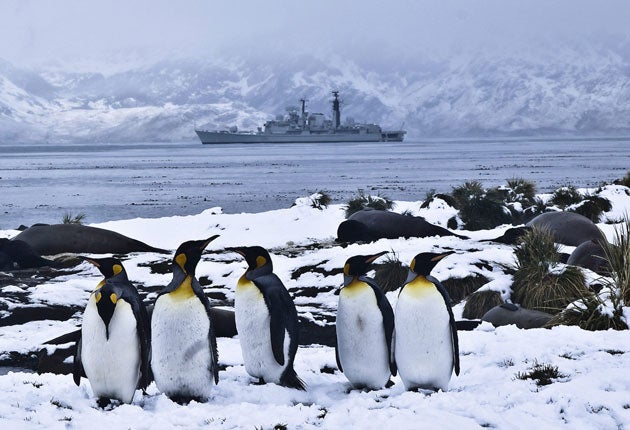'War is excluded from horizon,' says Argentina
But tensions rise as Buenos Ares recruits allies and promises to use all legal means to stop British oil drilling

War is not an option in resolving Argentina's dispute with Britain over the potentially oil-rich Falkland Islands, a senior Argentinian minister said yesterday. "War is excluded from our horizon," the Deputy Foreign Minister, Victorio Taccetti, said. But he insisted Buenos Aires would not give up its claims to the islands it calls Las Malvinas.
He denied that Argentina was escalating a row triggered by a British oil drilling project in the Falklands.
The dispute followed the arrival of the Ocean Guardian off the Falkland Islands. Drilling could begin as early as today or tomorrow.
Britain insists the exploration conforms to international law, but Buenos Aires argues that London is violating UN resolutions requiring a negotiated solution. The dispute pushed tensions between the two countries to their highest level since the 1982 conflict which followed Argentina's invasion of the islands.
"We are trying to convince the British that it is in their interest to negotiate with Argentina. This is not an escalation; this is just something that we have to do in order to protect our rights, because we consider that this exploration and eventual exploitation of our natural resources is illegal," Mr Taccetti said yesterday.
Speaking during a radio interview, Mr Taccetti said Argentina could do little beyond the new measure imposed by President Cristina Fernandez last week, which requires permits for any ships going through Argentine waters to the Falklands. The move was condemned by Falkland Islanders who said it intended to disrupt the drilling.
Buenos Aires is also hoping its neighbouring countries will co-operate to impose South America-wide restrictions. Mr Taccetti said Argentina would use "all legal means to restrict access to the islands from the continent", but added: "I don't think we can go much further."
Despite Mr Taccetti's public comments, Buenos Aires continued to step up the pressure over the drilling dispute yesterday, flatly denying Gordon Brown's claims that the British government was "talking to the Argentines" in an effort to resolve tensions.
Argentinian sources countered by claiming that there was "diplomatic silence" over the dispute – and reiterated their long-held position that meaningful negotiations could take place only when the UK agrees to discuss the sovereignty of the islands.
Argentina's Foreign Minister, Jorge Taiana, will meet and ask his counterparts at the Rio Group summit in Cancun, Mexico, next week to condemn what he called Britain's "unilateral and illegal" exploration in the islands. The left-wing Venezuelan president, Hugo Chavez, pledged his support for Argentina, saying Britain was "violating international law". "Get out of there; give the Malvinas back to the Argentine people. Enough already with the empire," he said.
Mr Taiana will meet the UN Secretary-General, Ban Ki-moon, in New York on Wednesday. According to a report in La Nacion newspaper, a source close to Mr Taiana said: "Argentina will speak diplomatically and peacefully. But Britain should talk about sovereignty."
Experts believe there could be rich energy reserves in the ocean bed surrounding the British Overseas Territory of the Falklands. The islands' legislative assembly yesterday cleared the Ocean Guardian rig to begin exploration work. It has spent the past month journeying from Scotland to the South Atlantic. It will be anchored about 60 miles off the islands over the weekend before drilling begins today, weather permitting.
The company Desire Petroleum says it expects first results in 30 days. It has said it plans up to eight wells in a campaign lasting six to eight months.
Royal Dutch Shell Plc struck oil in 1998, but decided against exploiting it as the then oil price of $10 a barrel made it unviable. With oil now at more than $75 a barrel, the economics of the Falklands' oilfields have become more attractive.
Last year, Argentina submitted a claim to the UN for a vast expanse of ocean, based on research into the extent of the continental shelf, stretching to the Antarctic and including the Falklands, South Georgia and South Sandwich Islands – all UK territories.
The drilling dispute has undone diplomatic work to repair relations. While sovereignty remains contentious, other tensions had been eased. Fishing agreements in the waters around the Falklands, which are rich in squid, have been established; and Britain has relaxed its insistence that no Argentina warship come within 75 miles of the islands to a mere 15.
John Hughes, a former British ambassador to Argentina, said yesterday: "It is unfortunate that oil exploration could not have been developed in a context where mutual collaboration already existed and was strengthened thereby, not further weakened. For collaboration and mutual confidence-building would surely be in both sides' interests in the South Atlantic."
The Falklands Legislative Assembly said that Argentina's attempt to disrupt oil exploration was "no surprise" but "nonetheless disappointing". The statement added that "all the supplies the industry needs are located here in the islands" and drilling would begin as planned next week.
Mr Brown has said the Government has "made all the preparations that are necessary to make sure the Falkland islanders are properly protected".
Argentina invaded the Falklands in 1982, before a UK task force seized back control in a short war. The Ministry of Defence said the UK has a "deterrence force" of four ships and 1,076 troops stationed in the Falklands.
Subscribe to Independent Premium to bookmark this article
Want to bookmark your favourite articles and stories to read or reference later? Start your Independent Premium subscription today.

Join our commenting forum
Join thought-provoking conversations, follow other Independent readers and see their replies